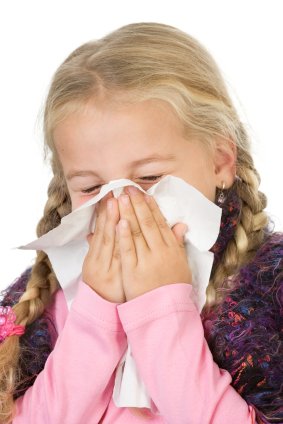by Stacey Schifferdecker
 When I was a child growing up in Colorado, none of my friends had allergies or asthma. Now, as a parent in Oklahoma, most of my friends’ children suffer from some types of allergies. I’m sure the different climate accounts for some of the difference, but it is also a fact that allergic diseases have increased in Western countries over the last 20 to 30 years. Why are allergies on the rise and how can we deal with them?
When I was a child growing up in Colorado, none of my friends had allergies or asthma. Now, as a parent in Oklahoma, most of my friends’ children suffer from some types of allergies. I’m sure the different climate accounts for some of the difference, but it is also a fact that allergic diseases have increased in Western countries over the last 20 to 30 years. Why are allergies on the rise and how can we deal with them?
Why are allergies on the rise in children?
Ironically enough, it may be the cleanliness of our lifestyles that are causing the rise of some allergies. If children are underexposed to minor environmental threats early in life, their immune systems do not develop properly and can overreact to perceived threats. This doesn’t mean you need to deliberately expose your children to dangerous viruses and bacteria. Simple childhood activities like playing in the dirt, building roads in a sandbox, rolling in the grass, and living with a pet can strengthen your children’s immune systems and help protect them from allergies.
Dealing with respiratory allergies in children
- Wash bedding and stuffed animals regularly in hot water to remove dust mites.
- Use impermeable mattress pads on all beds.
- Use a vacuum cleaner with a HEPA filter to trap small particles other vacuum cleaners miss.
- Clean heating ducts regularly
- Clean or replace furnace and air conditioning filters every month.
- Keep pets groomed and shampooed. Do not allow pets on the furniture.
- Use a dehumidifier in the winter and an air conditioner in the summer to keep air dry and prevent mold from forming.
- Give your child more oily fish, bananas and apple juice, which studies have linked to reduced allergies and asthma symptoms.
- Keep them indoors in the late morning and early afternoon, when pollen production is highest.
- Choose hard flooring, such as wood or tile, instead of carpet. Also choose wooden shutters instead of curtains.
- Has difficulty breathing
- Suddenly develops hives or swelling around the face and lips
- Has a cough or cold that lasts more than a week
- Has allergy symptoms that get worse for no apparent reason







Add Comment